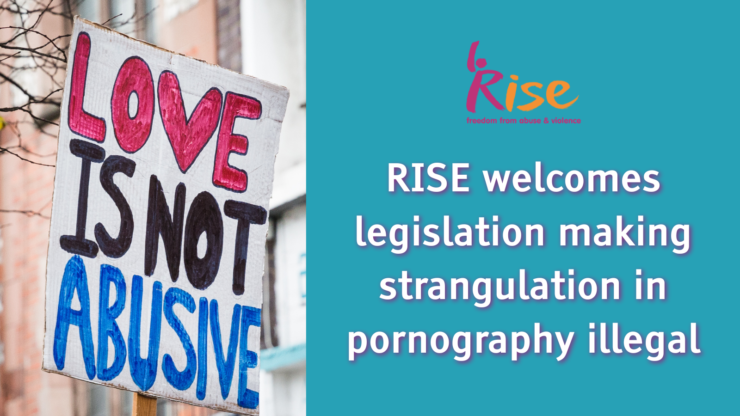Content includes violence including sexual violence
On the 19th June 2025, the government announced that it will be made illegal to possess, distribute and publish pornography depicting any act of strangulation, through the Crime and Policing Bill.
RISE welcomes this important update to legislation. There is no safe way to strangle, ever. The depiction of this violent and dangerous act in pornography has contributed to normalising and glamourising the objectification of, and violence against, women and girls. The average age for first sight of pornography is 13 – children as young as seven are seeing it. The normalisation of strangulation during sex has disrupted normal sexual development and put countless women and girls’ lives and health at risk.
Strangulation, and suffocation, became standalone offences in England and Wales in 2022. 23,817 reports of strangulation and suffocation were made to the police in those two nations in the first year of the offence recognised in law.
Forty-nine RISE survivors reported attempted strangulation or suffocation in the last year.
Organisations like RISE, that support survivors of domestic and sexual violence, know that fatal and non-fatal strangulation (NFS) are common. There is an increasing body of research and evidence for both the harms caused by non-fatal strangulation and the further risks it presents. The same research shows that perpetrators are overwhelmingly male, with victim-survivors being female.
Strangulation is a frightening experience, and many survivors have expressed fears for their life. Short term effects after non-fatal strangulation can include memory loss, confusion or loss of consciousness. Strangulation stops blood flow to the brain, and prevents airflow. Even short periods of strangulation can lead to brain injury, stroke or trauma symptoms.
Non fatal strangulation is alarmingly common.
A review of Women’s Aid data by the Institute For Addressing Strangulation (IFAS) in April 2025 showed that 1 in 4 women accessing their memberships community based and refuge services reported having experienced strangulation or suffocation. We believe this to be much higher.
The same report shared that SafeLives Insights IDVA dataset 2021-22 recorded that 32% of cases accessing their IDVA services had experienced strangulation.
There is also a noted link between non fatal strangulation and death.
An IFAS Analysis of Domestic Homicide Reviews* With A History Of Non Fatal Strangulation in 2024 showed that - out of the 80 cases they looked at - 53% (42 cases) of the victims of non-fatal strangulation were ultimately killed by a person who had previously non-fatally strangled them. It also reported that The National Police Chiefs’ Council Vulnerability and Knowledge Practice Programme (VKPP) report found that 20% of survivors who died by suicide following domestic abuse had been subjected to non-fatal strangulation prior to their death.
Strangulation during sex is most common among young people.
IFAS surveyed 2000 people in 2024, about strangulation during sex. They grouped people by age - 16-34, 35-54 and 55+.
35% of 16-34 year olds reported being strangled or choked at least once during consensual sex - compared to 78% of the 35-54 age group and 95% of 55+ group.
Strangulation is never safe, even if you have consented. True consent can only be given with a full understanding of the risks.
In any emergency, call 999
If you have experienced strangulation, and are experiencing medical problems as a result help is available from the NHS - speak to a GP, call 111 or if it’s an emergency, call 999.
Information from the IFAS explores problems and symptoms survivors may experience.
If you are experiencing strangulation within your intimate relationships in Sussex, call our helpline for support or call the freephone, 24-hour National Domestic Abuse Helpline
0808 2000 247 or get support in BSL here.
*Now termed Domestic Abuse Related Death Reviews The UK Government previously defined a Domestic Homicide Review (DHR) as ‘a multi-agency review of the circumstances in which the death of a person aged 16 or over has, or appears to have, resulted from violence, abuse or neglect by a person to whom they were related or with whom they were, or had been, in an intimate personal relationship, or a member of the same household as themselves. Since 13 April 2011 there has been a statutory requirement for local areas to conduct a DHR – now DADR - following a domestic homicide that meets the criteria.’


